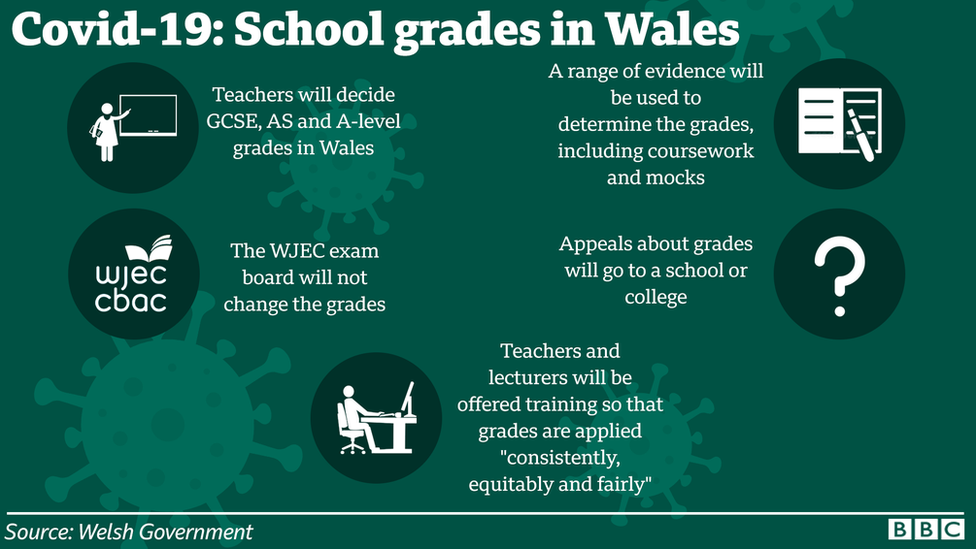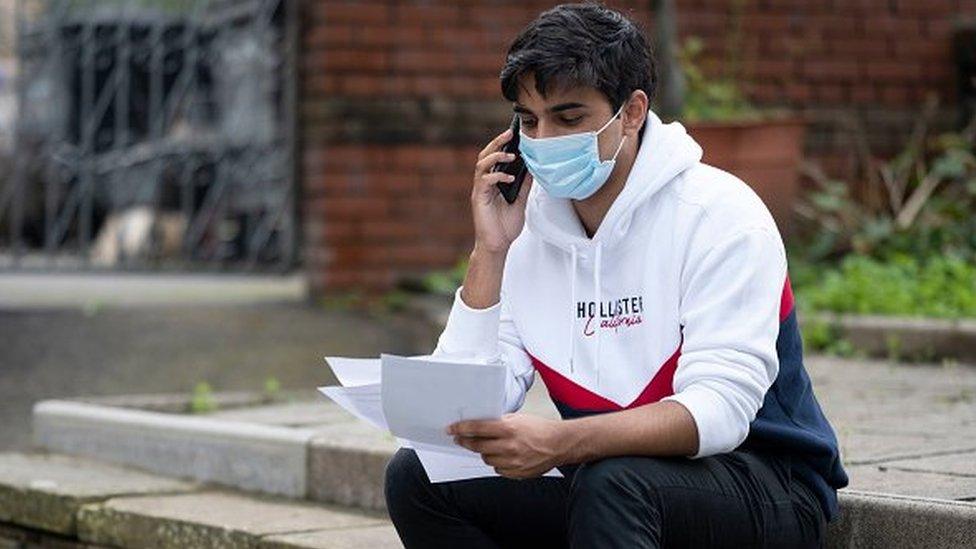A-levels 2021: How is results day in Wales different this year
- Published

Students protested about the Welsh Government's grading system last year
Everyone will be hoping for an altogether more low-key results day in Wales on Tuesday.
Last year the uproar around downgraded A-level marks led to a dramatic U-turn by ministers.
This summer there is no algorithm to "standardise" teacher grades and, crucially, the vast majority of Welsh pupils already know their results ahead of the official release.
So how is A-level results day in Wales going to be different in 2021?
For a start, it is earlier than usual.
Usually, A-level and GCSE results days are on subsequent Thursdays in the second half of August. However they have been brought forward to ensure enough time to process any appeals.
Can we expect the usual tears of joy or sorrow?

Students collect their grades at Ysgol Bro Myrddin in Carmarthen
In Wales, schools and colleges shared provisional results with pupils in June and they could then appeal.
On results day, some schools are simply confirming grades via email or post, while others, such as Olchfa Comprehensive in Swansea, are inviting pupils to celebrate their results becoming official.
The school's deputy head teacher Matt Salmon said it was a "rite of passage", even if pupils know what is inside the envelope.
"Whether there'll be the same level of excitement and celebration or, conversely, disappointment in some cases remains to be seen", he said.
But while surprises are unlikely, it remains a significant day for those hoping to go to university with places only confirmed after the official release of results.
And if you didn't quite get the grades you need, it's only now you find out whether there's any wriggle room or other options through clearing.

Provisional results "took away the stress", said A-level student Shenona Mitra
Shenona Mitra, 18, from Bangor hopes to study medicine in London and said having provisional results earlier gave students a sense of security.
"It took a little of the stress away from teachers and students because of how unpredictable things have been," she said.
"We needed that time to make sure things were ok and we could still go to university. If things needed to be changed, they could be within time."
How were grades decided?
Schools and colleges set them - or to use the official term, they are Centre Determined Grades (CDGs).
The decision to cancel exams was made last November, but the system that replaced it had to be ditched too when schools remained closed after Christmas.
At that stage it was decided that teachers would decide students' end-of-year grades based on evidence of attainment.

In practice that meant pupils sat a series of classroom assessments when they were back in school after Easter, though some claimed they were exams in all but name.
Gareth Evans, executive director of education at the University of Wales Trinity St David, said some pupils ended up sitting 30 or 40 tests.
"That is not ideal after three or four months out of face-to-face teaching due to a pandemic," he said.
"Perhaps we could have considered a little better the well-being and learning loss of those pupils rather than the race to examine them for their GCSE and A-level outcomes."

Cai Parry wants more focus on coursework than exams
Cardiff A-level pupil Cai Parry, 18, was part of a campaign last year calling for grades determined by teachers, rather than exams. He thinks there should be long-term changes to assessment, with more emphasis on coursework.
"That's a fairer reflection of how students are coping throughout the year, whereas if we pile everything on to just exams at the end… that has been a lot more stressful," he said.
Is there an algorithm this year?
No. Last year an algorithm to standardise results was blamed for lowering tens of thousands of the grades that had been assessed by teachers, and for the uproar that ensued.
A U-turn before GCSE results day meant pupils were eventually awarded the teacher grades and similar decisions were made elsewhere in the UK too.
Trying to avoid a repeat of last year's chaos has been a top priority. This year, the exam board WJEC has had no power to change grades, though schools and colleges have been asked to explain results that are significantly out of line with previous years.
What about the rest of the UK?
Something similar but with some key differences. Pupils in England weren't given provisional grades. That means those who've been studying over the border, or who have taken qualifications in Wales under English exam boards, will be feeling the nerves more than most Welsh pupils.
It's the first time results day is happening at the same time across the UK, as they're usually earlier in Scotland.
Results for BTEC and other vocational qualifications will also be released. As they are regulated at a UK-wide level, BTEC students will not have had prior sight of their final grades.

Some students will not even go to their school on results day
Are A-level grades going up?
There were 36,140 A-level entries for summer 2021, a rise of 16% compared with 2020.
This could partly be due to a bigger teenage population, while a rise in top grades at AS-level last summer might have encouraged more students to continue to A-level.
Mr Evans said there were too many variables to compare results.
"We're going to have to live with the fact that we can't compare year-on-year and this year's cohort of A-level and GCSE graduates have been through something nobody else has been through and, therefore, the results are not comparable," he said.
That said, nearly half of this year's A-level grades were top A* and A grades in Wales, the official results showed on Tuesday.
A total of 48.3% of grades were A* and A after what exam awarders called "challenging circumstances" due to Covid-19.
There was an increase at A* with 21.3% of candidates getting this grade, compared with 16.3% in 2020.
Altogether, 99.1% achieved A* to E passes.
- Published10 August 2021

- Published9 August 2021

- Published8 August 2021

- Published7 August 2021

- Published1 July 2021

- Published5 March 2021

- Published22 August 2020


